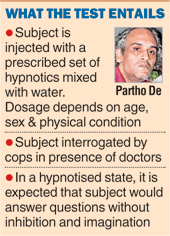
Police moved court on Thursday for permission to do a narco test on Partho De, suggesting that they don't entirely believe every statement made by the man who lived with his sister's corpse for more than six months.
The test, if permitted by the court and consented to by 44-year-old Partho, would involve administering a set of drugs to put him in a hypnotic state where a person would usually be unable to lie.
Although the results of a narco test aren't directly admissible in court, the findings or clues that emerge sometimes lead to evidence, legal experts said.
The police have already got the court's permission to get a forensic psychiatrist from Singapore to examine Partho. Forensic psychiatrist Jaydip Sarkar had been consulted by Delhi police while investigating the Nithari killings.
Investigators probing the 3 Robinson Street case - besides Partho's sister Debjani, their father Arabindo's burnt body was found in a bathtub on the night of June 10 - have cited the need to get answers to specific questions for the narco test.
"Usually, the police do this test only when they have strong reasons for doing so. If the accused isn't hiding anything, he would give his consent. But there is no law that can force him to undergo the test against his wishes," said criminal lawyer Sk. Salim Rahaman.
Sources familiar with the progress of the investigation said the presence of knives in Partho's house, the circumstances in which his father Arabindo was found dead and his alleged negligence of Debjani - he said she had starved herself to death - are questions that the cops have not found answers to.
Partho, who spoke to the police at Pavlov hospital for more than two hours on June 17, allegedly failed to give "satisfactory" answers to some questions. A police team visited Pavlov on Thursday for a second round of questioning but didn't get any new information, sources said.
"On being asked what happened to his father between June 6 and 10 - the period between Arabindo's last diary entry and his death - Partho said he would speak only in the presence of a Christian priest and his attorney," a source said.











